In the third installment of CHUD’s soundtrack review column, we’ve got fast cars, cartoon birds, Benedetective Cumberbatch, Liam Neeson’s Taken-on-a-Plane, and music from the dude in Korn who plays the bagpipes. Which soundtracks should you be adding to your collection? Read on to find out!
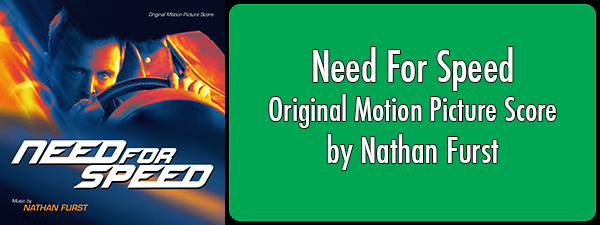
Who composed it?: Nathan Furst
Who released it?: Varese Sarabande
Who’s it for?: Film score fans who want a fresh, different take on action scores.
What’s the Lowdown?: Color me shocked, but this music is pretty damn great. Composer Nathan Furst (Act of Valor) has made an action film score that proudly stands apart from the current trend of big-beat-infused, stuttering electro-rock action scores. Furst deftly combines Cliff Martinez-style synth beds and super-clean, chiming electric guitar with real orchestration. This creates a very elegant, uncluttered sound that avoids the potential pitfalls of busy, bombastic percussion and heavy rock guitars. He also doesn’t shy away from using the brass section, so you’ll hear a nice helping of trumpets and horns to fill out the orchestra. Furst paints with big, bold strokes of primary colors, and my god is it refreshing to hear the relative simplicity of Need for Speed. The soundtrack album is available now digitally, but we won’t see the CD until April 15. Get this thing on Amazon, already.
Standout Tracks:
- Marshall Motors
- Koenigsegg Race
- Right Seater
- California Crossing
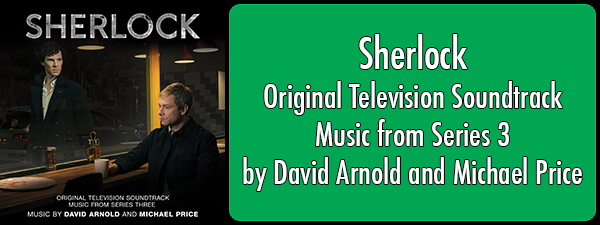
Who composed it?: David Arnold and Michael Price
Who released it?: Silva America
Who’s it for?: Cumberbitches.
What’s the Lowdown?: I’ve never seen a single episode of this popular BBC series, but I can assure you I’m getting lots of peer pressure to break down and finally watch it. So remember all that shit I just said about “the potential pitfalls of busy, bombastic percussion and heavy rock guitars”? Well composers David Arnold and Michael Price (who worked together on Hot Fuzz) succumb to a few of those pitfalls here, but most of the time they do a really lovely job of avoiding them, while still managing to integrate rock and electronic elements into their sound. The orchestral arrangements featured on the album don’t sound huge and epic (there’s a lot of synth instruments), but they are fun and well-written, and they’re working on a TV budget, so I can’t expect the kind of humongous real orchestral sound we find in big-budget cinema. The score is at its best when it keeps things simple, and goes unabashedly electronic. The opening track, How It Was Done, is one of the strongest tracks on the album, starting with a thick, slow, HEALTH-like groove, soon escalating to a synth-rock whirlwind. The stuff that doesn’t work at all is exemplified perfectly in the track John is Quite a Guy. The strings are sawing away, the percussion is blasting, the horns are blaring, and the synths are chirping out distracting little triplets. It’s overloaded, and unpleasant to the ear. However, as I said earlier, Arnold and Price spend most of the album avoiding stuff like that. I’ll recommend this album, but with reservations. Buy it on Amazon!
Standout Tracks:
- How It Was Done
- Vanishing Underground
- Major Sholto
- The East Wind
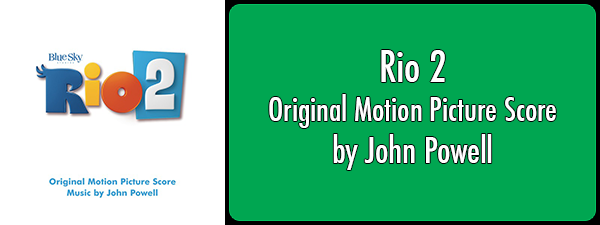
Who composed it?: John Powell
Who released it?: Sony Classics
Who’s it for?: Samba/bossa nova enthusiasts and cartoon characters.
What’s the Lowdown?: This is really fun stuff. I’ll most likely never see this film, and I haven’t seen the first one, either. Composer John Powell is returning from the first one, which I suppose is a good sign. His use of samba, bossa nova, and Brazilian jazz is what gives this score its flavor, and the score is at its best when it’s keeping things jazzy. Otherwise, it’s grand and cartoony, which one might expect. It sounds like a cartoon score should, full of slapstick and big, telegraphed emotions. There are more than a handful Looney Tunes moments, where the music constructs a concrete image of exactly what is happening on screen. You can almost see the characters falling off cliffs or getting smushed by anvils. The track Sideshow Freaks is a great example of what this score is all about, opening with a bit of baroque harpsichord, before slamming face first into full-on samba mode. Then, the two are combined, and it’s 100% wacky. The next track, Stalking the Ferry, features some very Elfman-esque choral passages, but also keeps that fun Looney Tunes feel. The whole score is eclectic, fun, funny, and loaded with so much manic energy that it’ll wear you out if you listen to the whole thing straight through. I’m highly recommending that you give this a listen when it arrives on April 8. Or, you could pre-order it on Amazon.
Standout Tracks:
- Batucada Pagode
- Fireworks on the Roof
- Sideshow Freaks
- Battle for the Heart of the Forest
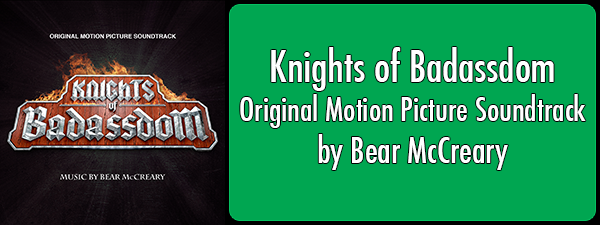
Who composed it?: Bear McCreary
Who released it?: Sparks & Shadows
Who’s it for?: LARPers, metalheads, and bagpipers.
What’s the Lowdown?: This is the third Bear McCreary soundtrack I’ve had the pleasure of reviewing, and it has an uphill battle ahead of it, because McCreary’s work on Starz’s Black Sails quickly became my favorite score of his. One of the things that makes Bear McCreary scores so fun to review is he makes the job so easy. He writes in exquisite detail about his work on his blog, even going so far as to take the film’s themes and put them into sheet music. I can play the themes before ever hearing them in context, which is awesome, because now I’ll never miss when one of those themes pops up. And they do pop up often in Knights of Badassdom, a musical mashup of Queen, heavy metal, irish folk, and full orchestral glory. Heard prominently (yet tastefully) in Knights of Badassdom are Irish Uilleann pipes and smaller Scottish bagpipes, which should satisfy the Flogging Molly fans among you. McCreary has shied away from brass instrumentation in his recent work, but there’s lots of noble horn lines to be found here, so I’m happy. There’s also lots of great woodwind work, with flutes and english horns often heard playing Gwen’s Theme, which was written for Summer Glau’s character. While it lacks the broken-down charm of Black Sails, Knights of Badassdom’s music is fun as hell, and I couldn’t imagine a more fitting sound for this film. Speaking of the actual film, I’m pissed that director Joe Lynch didn’t get final cut, so I’m holding off on watching it in case there’s a director’s cut looming. I doubt we’ll ever see Lynch’s preferred version, but here’s hoping. The soundtrack is available now, so buy it on Amazon!
Standout Tracks:
- The Kingdom of Eliphaz
- Slightly Badass
- Gwen’s Theme
- Earn our Valor
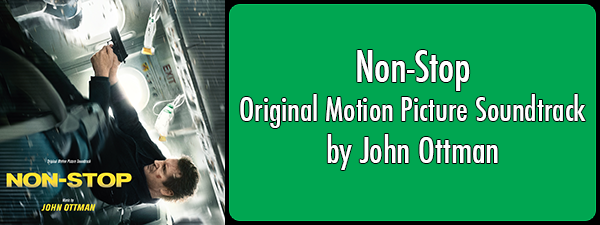
Who composed it?: John Ottman
Who released it?: Varese Records
Who’s it for?: People who need something to listen to while flying.
What’s the Lowdown?: Reteaming with director Jaume Collet-Serra after working with him on Orphan, Unknown, and House of Wax, John Ottman is back in action. In a truly shocking move, Ottman’s score for this Neeson-led plane thriller features guitars (oh?), orchestra (gasp!), AND SYNTHS (swoon!). It’s today’s standard action score, done in standard fashion. It ain’t bad, but it ain’t gonna impress, either. Now that Neeson has become the dark John McClane, Ottman isn’t afraid to give him a more traditionally heroic theme, featured prominently in the opening track (which is heard in the film’s end titles). To its credit, this score does exactly what it needs to do, by escalating the energy level required to maintain suspense. There are some brief respites from the mounting tension, like the track Reluctant Passenger/Blue Ribbon, which gives us a look at a different side of Ottman. Much like the film itself, Non-Stop’s score it perfectly acceptable, yet mostly unremarkable. Not convinced? Listen for yourself on Amazon.com!
Standout Tracks:
- Non-Stop
- Reluctant Passenger/Blue Ribbon
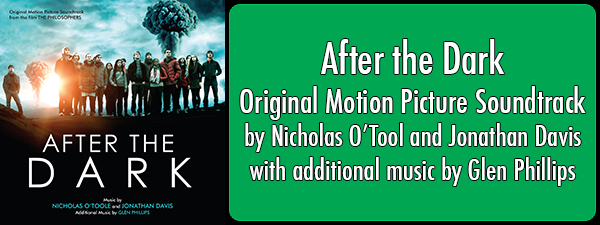
Who composed it?: Nicholas O’Toole and Jonathan Davis, with additional music by Glen Phillips
Who released it?: Varese Records
Who’s it for?: Diehard fans of the film.
What’s the Lowdown?: One of the most unlikely trios to ever write a film score, composer/programmer Nicholas O’Toole, Korn frontman Jonathan Davis, and Toad The Wet Sprocket frontman Glen Phillips have crafted something I had no hopes of predicting. Though repetitive, their music creates a unique, haunting, ambient sound. From a composition standpoint, however, it’s not terribly inventive or stimulating. The main motif, played on clean electric guitar, is featured over and over again, in the same key, with little to no variation. The same synth sounds reappear frequently, and are stale by the half-hour mark. Since the film takes place in Jakarta, there is some Indonesian gamelan percussion used, but it’s very sparse. You’ll hear some of it in the track Plato’s Cave, which is a great example of the album’s atmosphere. There are some gorgeous vocals on the track Choosing, something I wish was used more frequently throughout the score. I love minimalism, and I suppose you could say that the score is very minimalistic, but this comes off as simplistic, never offering enough complexity to really maintain my curiosity. If you’re into that, this album is currently available through Amazon.com.
Standout Tracks:
- Plato’s Cave
- Choosing